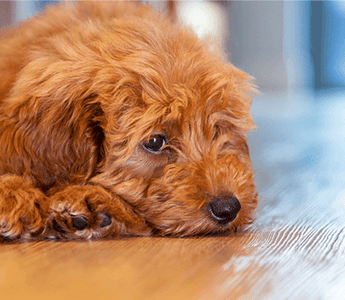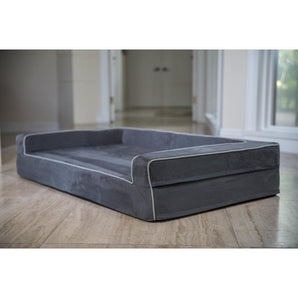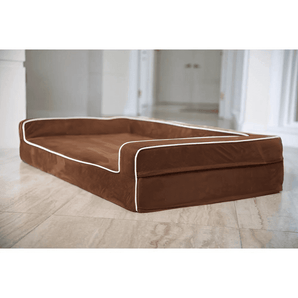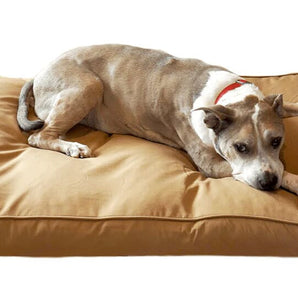Are dogs peeing in beds in your home? If you're cycling through beds because your dog keeps having accidents, you know how frustrating it can be. Not only is it expensive to replace beds, but frequent accidents may point to other health issues.
Fortunately, you can equip yourself with the knowledge to handle this issue. Read on to learn why you have a dog peeing on the bed — and what you can do about it!
Why Do Dogs Pee in Their Bed?
When you have a dog who urinates in their bed, your dog may have behavior issues — or something more serious. The issue could also be that you have young pups a little too eager to assert themselves!
Young Dogs Are Excited
Did you just adopt a new puppy? Youth may be the reason that you have a dog peeing on the bed. While it's tempting to scold a puppy for this kind of behavior, doing so may just confuse them.
A puppy could see urinating as bad behavior if you yell. The better practice is to take your puppy outside more often — and praise them for defecating outdoors. Give them a treat or reward when they pee in the proper place.
Dogs Engage in Territorial Marking
When a dog pees in their bed, they may be marking their territory. Several reasons can prompt a dog to this.
For starters, a dog may want to claim its space in a new home. When you uproot, even an older dog can act out in this way. Give your dog plenty of playtime and exercise to help them feel comfortable in a new environment.
In other instances, a dog who feels threatened by other pets in the household may be gunning for your attention. Marking their territory is a way of communicating to other pets that the bed belongs to them. Be sure to give your pet enough one-on-one time so they aren't jealous or concerned.
Try Washable Bed Covers
Whether you're working with younger or older dogs, washable bed covers offer a great and economical solution. You can use these on your pet's bed and encourage them to sleep there — and not on your bed. Just throw them in the washing machine when an accident occurs!
Remember that puppy training doesn't happen overnight. And sometimes puppies simply lose control of their bladder when they're too excited. But if you notice that even the best practices aren't working for your pet, take them to a vet to get checked out.

Dogs Peeing in Beds May Indicate Urinary Issues
Not every wet bed can be attributed to naughty behavior. For many dogs, the issue may be related to a bladder issue. It's critical that you watch for any noticeable changes in your dog's behavior.
The Issue Could Be a UTI
Dogs with urinary tract infections (UTIs) have inflamed bladders due to infections in the urinary tract. And that results in an urgent need to pee, regardless of location.
If you notice that your dog is urinating more often, or struggling to do so, they may have a UTI. You also could notice blood in their urine or urine that dribbles from their genital area. Some breeds, such as the Yorkshire Terrier or Bichon Frise, may be more susceptible to UTIs.
Check for Kidney Problems
A dog that is urinating more frequently, especially during the overnight hours, could be dealing with kidney problems. This is a serious issue that requires veterinary attention. You'll want to know if the problem is acute or chronic.
If your dog ate bad food, that could cause an acute issue. As another example, dehydration or obstructions can diminish blood flow — and lead to acute infections. Dental disease may spur chronic kidney disease in older dogs.
Ask about Diabetes
Diabetes can be another cause of a weak bladder and frequent urination. Have you noticed that your dog is thirsty all the time? If so, take your dog to the vet for a check-up.
Dogs with diabetes may experience extreme fatigue or weight loss. In some forms of dog diabetes, a dog cannot produce enough of its own insulin due to pancreatic issues. Because of this, a dog with diabetes may need a specialized diet and insulin injections.
A dog with diabetes may drink and urinate more as it tries to expel sugar. If a dog's blood sugar is too high or low, this could lead to serious health issues. Female dogs and older dogs are most at risk for this potentially dangerous health condition.
Watch for Other Medical Issues
There are other medical conditions beyond urinary issues or kidney disease that may trigger bladder issues. When in doubt, seek a licensed veterinarian if simple dietary or behavioral changes don't remedy the problem.
Cognitive Disorders Contribute to the Problem
Why do dogs pee in their own bed? The problem may be canine cognitive disorder — otherwise known as dog dementia. The symptoms are similar to those that humans with dementia can experience.
This is a condition more common in older dogs as their brains age. You may observe that your dog seems more confused or irritable. Or a dog may start to neglect to groom itself or ignore your commands.
Dogs with dementia might forget where they are supposed to urinate, too. Although this behavior can be frustrating, it's critical not to get upset since you may fracture their sense of trust.
Seeking dietary supplements from your vet and using washable crate pads are ways to combat this challenging issue. While there is no way to undo dementia, omega-3 fatty acids and antioxidants can help with brain health.
Incontinence Issues May Be the Culprit
A dog peeing while sleeping may indicate incontinence issues. In other words, your dog may not have the sphincter strength to avoid defecating. This can be especially problematic in dogs that have been spayed or neutered.
If your senior dog is dealing with incontinence, do your best to be patient with them. Make sure to use removable and washable pads in their crates. And give them even more time than usual outside to relieve themselves.
Dogs Could Experience Emotional Issues and Behavioral Problems
Sometimes emotional tendencies and innate personality traits can lead to dogs peeing in beds. For sensitive and submissive dogs, excessive urination can mean anything from fear to fondness.
Anxiety Can Be a Trigger
Are you wondering, "Why does my dog pee on his bed?" If you just moved, it may be that your dog is dealing with separation anxiety. A new home or work schedule will make them concerned about their wellbeing.
Anxiety can trigger irregular bowel movements. As a result, a dog peeing in sleep may be suffering from urinary incontinence.
Additionally, an anxious dog may be more likely to chew on any furniture in its path — including its bed. Chew-resistant beds represent one way to handle this issue. As a bonus, they're washable!
Dog Peeing on Bed May Be an Act of Submission
When you notice the dog peed on dog bed, it's not necessarily a retaliatory act. In fact, it may be a sign of submission. Dogs who get anxious or scared may use submissive behavior to get your attention.
This type of behavior shows itself more often in younger dogs. Even so, an older dog may simply be more cautious and concerned. When a dog like this urinates, it may mean that they are showing you respect and acknowledging your authority.
Be wary of scolding your dog in this situation. It may breed more urination. Instead, try to correct the behavior by rewarding your dog when it urinates outdoors.
How to Stop My Dog from Peeing on His Bed
What should you do when you stumble onto a soaked bed or puddle of urine? The best course of action is to start cleaning with odor and stain-removing products.
Start Cleaning
You may have tried searching, "Dog peed on bed how to clean." When your dog has an accident, you must clean up the mess thoroughly and promptly to remove the scent. Believe it or not, your dog is actually interested in the smell and location of its urine — and will pee in the same spot again.
Blot the area with newspapers or an old towel to soak up any urine that might be on a pillow or bed. Use water to clean the area. Follow up that step by applying baking soda to the area and then vacuuming it the next day.
You also can use another homemade option to kill the smell. Mix equal parts water and distilled vinegar. Then add about two teaspoons of baking soda.
Once the ingredients are mixed, spray the affected area. Let the liquid sit, and then clean it with towels. For more stubborn areas, use an enzymatic cleaner to get rid of the odors.
Correct the Mistake in the Moment
Did you catch your dog in the act? Rather than wagging a finger and raising your voice, try to correct your dog's behavior on the spot. Clap your hands to get their attention, and then take them outside to finish.
Don't use a negative tone with your dog since this could prompt them to misbehave again. Once they have finished urinating outside, offer positive reinforcement. Keep doing this each time until they learn the right behavior!

Other Steps to Help Resolve the Problem
There are other ways you can try to correct your dog's behavior. You'll need to invest the time and consideration, however, to see results.
Commit Time to Train Your Dog
You may be stuck wondering, "How to stop dog from peeing in the house?" When this phrase starts to take over your thoughts, it's time to look into training.
Training your dog doesn't necessarily end during puppyhood. When a dog lapses into bad habits, you can use crate training to correct the behavior. You'll need to start by acquiring a crate that is large enough for your dog to lie down inside.
The gist of crate training is that you reward your dog for spending time in their crate. For a dog prone to anxiety-induced bladder leaks, the crate can have a calming effect. You want your dog to know that their crate is a safe and comfortable space where they can be alone.
Stick with a Predictable Schedule
Make sure that your pet has plenty of time to urinate outside. When you leave your pet alone for hours at a time, their bladders may simply be too full. Consider creating an enclosed yard or pen so you can give your pet the space to roam freely.
Is your dog stressed because your work schedule suddenly changed? When you spend more time out of the house — or at different times of day — your dog will notice. When possible, try to block in break time with them or hire a dog walker to ensure that your dog gets enough attention.
Offering your dog anxiety chews may be another effective way to alleviate stress. With ginger root, chamomile, and a host of other natural ingredients, you can trust that they are safe for your favorite pet.
Why Do Dogs Pee in Their Own Bed?
Dealing with dogs peeing in beds can be stressful and exhausting. It takes time to reroute your dog's behavior. And it takes time and money to wash or replace your dog's bed every time an accident happens.
Sometimes the standard pet store beds won't cut it for a dog who's struggling with accidents. Whether your dog is aging or anxious, there are better beds and covers. When you need the right bed for your dog, contact us and we can help!






